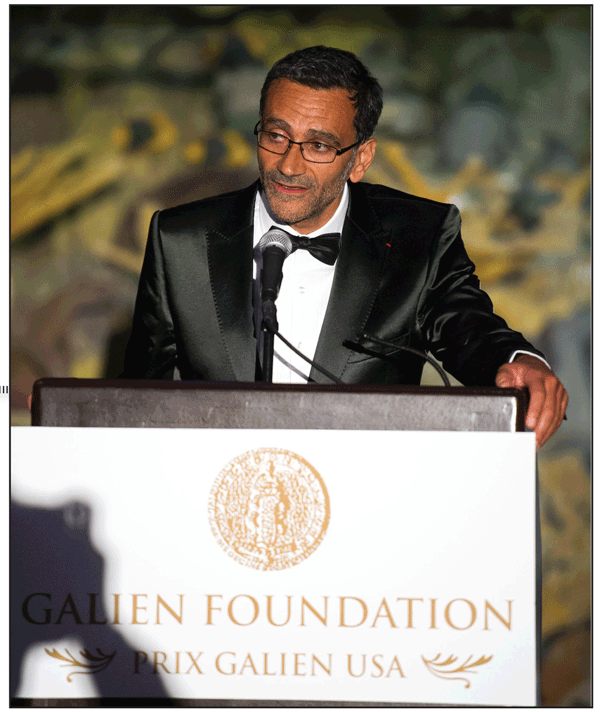As Chairman of The Galien Foundation, Bruno Cohen recently hosted the 8th Annual Prix Galien USA Awards and Gala, honoring excellence in research, development and innovation in the biopharmaceutical and medical science industry. And this world-renowned group has grown to honor the industries’ best in more than seven countries, including emerging countries.
This year, The Galien Foundation continues to push its life-saving mission forward. Bruno Cohen spoke to PM360 about new programs for 2015, what innovation means, Ebola and about how the recognition of the industry’s best can help to uplift pharma’s reputation.
PM360: Can you describe the evolution of The Galien Foundation, how your mission has grown through the years and where it is headed in 2015?
Since its initial incarnation in 1970 as the Prix Galien (created by Roland Mehl, a pharmacist in France, to honor Galen, the father of medical science and modern pharmacology), the mission of the organization has remained resolutely dedicated to improving the human condition through advancing biomedical innovation.
In 2009, the organization evolved into The Galien Foundation, with the expansion of its board to include many well-known medicine and science Nobel Laureates.
In addition to honoring excellence in scientific innovation through The Prix Galien, The Galien Foundation initiated the annual Galien Forum in 2010, now in its fifth year, to provide a unique opportunity for industry and government leaders—as well as academics throughout many fields of medical and scientific research—to discuss and debate pressing medical needs facing global societies.
This year’s timely program addressed new guidelines for treating cardiovascular events, the development of exciting new immuno-oncological therapies, and neurological advances. Moreover, emerging and ongoing issues, such as access to medical care, global and digital health, and the crossroads of innovation and entrepreneurship were also front and center.
In recent years, the Foundation broadened its scope from Europe and the U.S. to become a truly global Initiative. The Foundation also created the UBISTART Awards to reward the most promising healthcare startups. The expertise of the jury members shows the importance of this award in the eyes of the international community.
The Galien Foundation leads a call to action to provide a view, as summed up by Noble Peace Prize Laureate Professor Elie Wiesel “for people outside the industry to see that those working in the industry are focused on saving lives and improving the human condition.” How is your foundation advancing this, especially when many still hold a negative view of the pharmaceutical industry?
While that issue is huge and daunting, especially with the cost of global healthcare continuing to escalate, The Galien Foundation believes that ongoing education is the most effective way to underscore and reinforce the value of the significant contributions made by the biomedical industry.
That’s the reason we have strongly advocated for greater recognition of important new treatments and have strengthened the ties among industry, governments and academia. Innovation will happen only when all stakeholders are collaborating and contributing, each according to his expertise.
The Galien Foundation recognizes, fosters and rewards excellence in scientific innovation that improves human health. How do you define innovation, Bruno?
I consider that the patient is in the most relevant position to speak about the value of the innovation. In order to strengthen the link between the researchers and the patients, The Galien Foundation has created the “E-book of Innovators.”
But in my opinion, innovation is an idea, treatment or service that brings us closer to advancing the human condition and progressing the welfare of humankind. Sometimes innovation comes from failures or from the unlikeliest of sources. Last year, in 2013, the prize for Best Technology Product was awarded to Merck—a global pharmaceutical company—for the development of Zostavax (Zoster Vaccine Live), while the Prize for Best Pharmaceutical Agent was awarded to Genentech—a biotechnology-focused innovator—for the development of Zelboraf (vemurafenib).
So where do you see not only the most opportunity for innovation, but also the most innovation occurring?
I’d like first to point out that from 2000 to 2013, more than 400 new medicines were approved by the Food and Drug Administration (FDA), and more than 5,400 medicines are in development around the world.
One of the areas where we have seen great innovation and continued progress over the past decade is in cancer and immuno-oncology research.
This year The Galien Forum hosted a panel discussion on advances in cancer immunotherapeutics and a debate on “The Role of Innovation and Entrepreneurship in Cancer Research.”
Can you talk a little bit about your new program “A New Agenda for Global Health,” and perhaps how the current Ebola crisis in West Africa relates to it?
Yes, the Ebola virus is getting a great deal of attention these days, and for good reason. The Ebola epidemic in Africa powerfully shows the problems that exist in the role of governments, nongovernmental agencies and, of course, the private sector in the struggle against this plague.
We are forced to remark that it is the industry that has the answer to this major risk to public health in developing countries. Our selection of Dr. Bernard Kouchner, Founder of Doctors Without Borders, as the 2014 Pro Bono Humanum Honoree, an award that recognizes exemplary and innovative efforts in improving the human condition, is particularly timely this year.
However, let us not forget that there are myriad global diseases and public health issues that need to be addressed through ongoing biomedical research. The Galien Foundation provides an opportunity to surface and tackle those needs, with industry, government and academia working together to identify solutions.
Is there anything else you would like to address?
Just to reiterate that it is only through such collaboration that we can begin to chip away at the mystery of global diseases.







